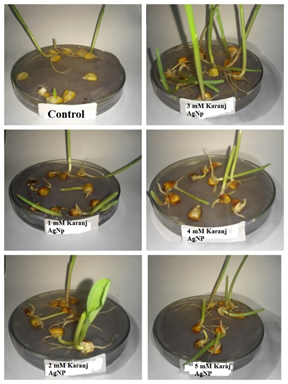Authors: Parimal Udgave
Nano-biotechnology, Bio-nanotechnology, and Nano-biology are the new terms emerging in the field of science in recent years where biology is linked with nanotechnology. These are applied to the nano-devices, nanoparticles, and other nanoscale phenomena. Nano-particles have gained special attention in recent years especially because of their properties which increase the germination rate and subsequently production of the plants. Nanoparticles typically have dimensions in the range of 1-100 nanometers and can be nanoparticles can be made by using a vast variety of substances. The characteristics and behavior of nanoparticles at the nano level vary considerably as compared to micro level. This is because of the surface properties and quantum effects. These results in changing the chemical reactivity of nanoparticles. Recent discoveries in production technologies have led the possibility of engineering the nanomaterials by modifying their size and composition. This technology is creating targeted applications in the chemical and biological applications. The chemical applications are focused on catalytic properties of nanoparticles , chemical degradation of dyes and thermal applications by using Surface Plasmon Resonance (S.P.R) properties of nanoparticles At present, nanomaterials are being used in the wide range of applications such as in biotechnology, medicine, pharmacy, ecology, electronics, and others. In which the agriculture sector is the economic backbone of major countries in the world. This is the major factor in the profitability of nanomaterials.
Amongst the most widely studied silver nanoparticles are the most promising and triggering wide range of biological processes which includes chemotherapy multiple drug resistance and antimicrobial agents It has attracted intensive research interest and getting wide recognition around the globe. In the recent years, the variety of silver nanoparticles containing consumer products has become popular. It is observed that silver nanoparticles do not affect living cells. It might be because of the attachment to the cell wall.
In the past years, researchers have investigated the effect of different nanomaterials on plant germination and development along with the increased crop yield. As the early plant growth starting from seed germination directly affects the crop yield at later stages. Therefore, a similar trend may be observed from early, growth and yielding stage of crops. Researchers may also able to improve the crop yield which will replace conventional fertilizers.
This experiment clearly indicates the best effect of silver nanoparticles and supports and hints the future of Nano-biotechnological applications in Agriculture.
The objective of the experiment was:
To study growth promoting effects of silver nanoparticles on the Groundnut (Arachis Hypogea, Variety-TPG-41), and Maize (Variety-African tall).
Obtained Results:
The present experiment demonstrated the eco-friendly method for the silver nanoparticles. Silver nanoparticles were prepared from aqueous leaf extracts of plants. This is an easy and fast method for the synthesis of nanoparticles.
Cymbopogon (Lemongrass) silver nanoparticles were effective for growth and development of Groundnut (Arachis Hypogea) which can be clearly seen in figure No. 1 a and b.

Fig No. 1-Effect of Cymbopogon silver nanoparticles on Groundnut (Arachis Hypogea) seeds (Variety-TPG-41)
A) Root of Control Plants
B) Root of Cymbopogon silver nanoparticles treated seeds (Groundnut-TPG-41)
Figure no.2 clearly indicates the effect of Karanj ( Millettia Pinnata) Silver nanoparticles on Zea mays seeds. Treatment of 3 mM silver nanoparticle formulation indicated 100% germination rate along with the development of seeds.

Fig. No. 2- Effect of Karanj (Milletia Pinnata) Silver nanoparticles on Maize-Zea mays seeds
Future perspectives:
- 1. Nano-fertilizer production
- 2. Production of efficient delivery system for nutrient delivery in crops
About Author / Additional Info:
I am currently working as Assistant Professor. I completed my MSc Biotechnology at Sheffield Hallam University. My research interests include Nano-biotechnology, Plant biotechnology, Soil and water conservation and management, Eco-toxicology and Agroecology.